Joshua Clover (1962-2025)
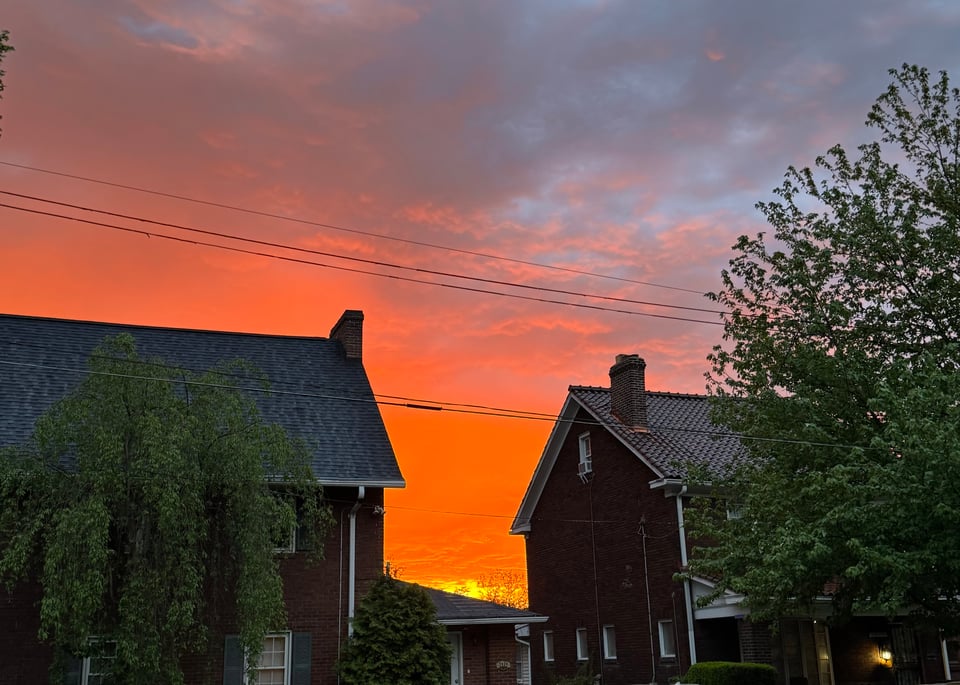
The poet Michael Robbins emailed me on the night of April 27 to tell me Joshua Clover had died. I could tell you that I sobbed, immediately and hard and unexpectedly, and that I have spent the time since trying to understand my relationship to Joshua and, less speculatively, to myself. Joshua would not do that, though. When he was hit by a truck in May of 2018, he wrote this piece about his accident, the aftermath of which involved him dying for a minute or so. He mentions “Slow Burn” by Kacey Musgraves, pain management, and a nurse from Lebanon. There is no crying. (Until I came back to this piece, I didn’t know that we had both been in hospital at the same time. In 2019, he was recovering in California while I was finishing a forty-two day stint in a Poughkeepsie rehab for alcoholism.)
In her obituary for The Nation, the poet Juliana Spahr called Joshua Clover a “militant, poet, political theorist, organizer, and giver of gifts.” If you don’t know him, that list is a good cheat sheet for Clover’s reflexes and commitments. (Juliana was one of Joshua’s closest friends and you should give her text primary consideration.) Spahr also presents some of the social media attestations to his generosity: “He bailed me out of jail on May Day once; without knowing me, he contributed thousands of dollars to help cover my bail; I e-mailed him out of the blue and he edited my first book of poems.” Joshua, habitually and as a principle, considered others. And, as Spahr writes, the refusal to die was central to his project.
Joshua was in a different hospital when his body died a few weeks ago, to treat complications from an affliction that was never entirely diagnosed. The writer Sarah Miller was one of the friends who visited him that Saturday, only hours before he died. Joshua would not listen to the Post Malone song Sarah loved and which she hoped he might come to appreciate. Maybe he would have.
The first thing I did after his death was try to retrieve the writing Joshua did for the Voice and Spin, much of it under the pen name Jane Dark. (Jane Dark, Jeanne d’Arc, Joan of Arc—get it.) He/she was the sole author of a zine called Sugar High, which eventually migrated to the Village Voice. In 1996, before Clover had published anything there, the Voice ran a feature on Sugar High by a writer named Rob Brunner. He gets some quotes from Dark, including the following, which works as Clover’s mission statement:
Not that Dark is in the dark when it comes to underground music, as passing references to Goldie, Tricky, and Slint prove. But she prefers Trisha Yearwood, Paula Abdul, and Janet Jackson. “With cutting-edge music you get a good idea of someone's individual, quirky vision,” she says on the phone from her Berkeley, California, home, “but it doesn’t tell me anything about the world.”
The world Dark/Clover spoke of in 1996 was precisely the collective that his lifelong friend Louis-Georges Schwartz was talking about in this recent Instagram post: “As a humanities scholar, as a pop critic, and as an artist, Joshua’s great contribution was trying to imagine audiences, readers, voices, and protagonists as collectives. Indeed, like his beloved Walter Benjamin, his method was to try to imagine them into existence.” Why would Joshua’s awareness of the larger cohort be hobbled by something as obvious as taste? He did like what he liked but that was only in addition to and after he saw its value as a representation of some larger group. To get a more immediate taste of Joshua, this 75-minute video interview conducted in 2016 is great—over an hour of someone who describes himself as “very negative.” I also loved this 40-minute RIP compilation of Clover audio from The Antifada.
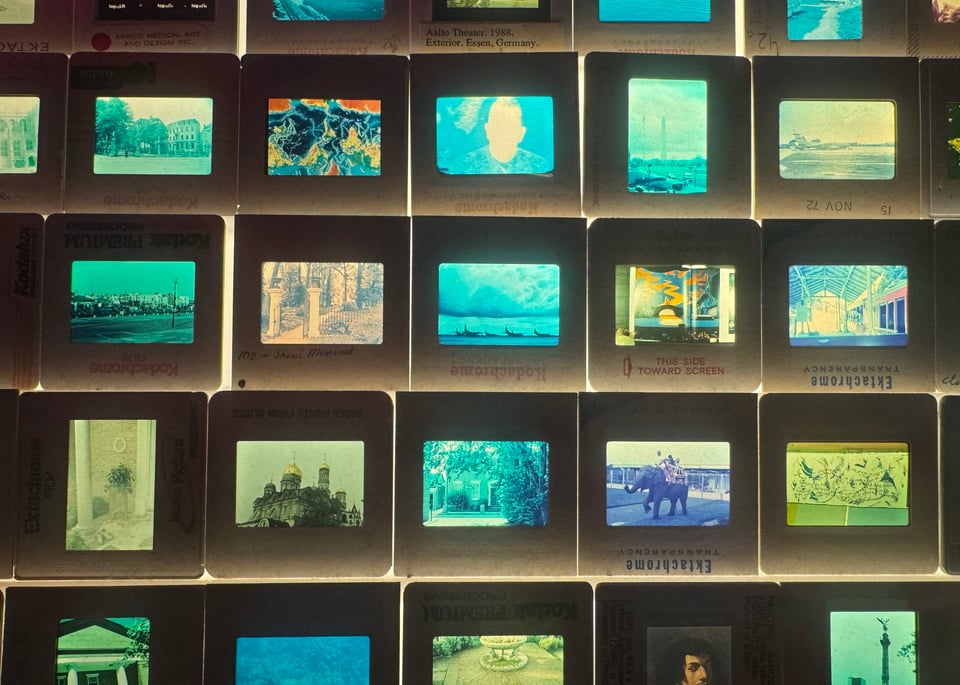
I posted this on April 27: “There is an embarrassing video on the internet of me playing ‘Since You Been Gone’ on guitar and singing (badly) and the only reason I did it is because Joshua Clover asked me to form a band for one show and we learned that song and Grant Hart's ‘2541’ and Miranda Lambert’s ‘Kerosene’ and from 2000 to 2005 we talked almost every day and it doesn't matter that we fell out (or didn’t) I rarely write something without wondering what he’d think and wishing we were still giving each other a hard time in real time.”
We played that show, billed (I think) as The Lower Thirds (was it?), at the Bowery Poetry Club in 2004 or (maybe) 2005. It was fun. I haven’t checked to see if the video is still up. When Anahid Nersessian saw my post on Instagram, she sent me a recording of Joshua playing “2541,” thinking maybe I was the second voice in the background. I was not—this was the same recording he sent me when we learned the song. Anahid and I texted.
April 28 2025
SFJ: he was so often right
AN: Even when he was wrong!
SFJ: I had it in mind to send him my book and one of our albums and kinda break the ice
he would hate this band lol
he would be like “why did you send me what I can only describe as jazz”
AN: I used to say Joshua was the first person who made me feel like I had good taste and also he could make me feel so so stupid for liking, say, the Chameleons
SFJ: absolutely
he could make the simplest aesthetic choice feel like a total moral failure
AN: Exactly
SFJ: and he could make the smallest decision feel like a spiritual coup
we hadn’t spoken in years
AN: That happens
People are so important and then other relationships or concerns supplant them
SFJ: i once said that if god came down and granted liberation to all people on the one condition that Clover had to stop correcting people, the world would remain imprisoned
AN: Hahahahaa
He’d take an actual bullet for the revolution but not being right would absolutely be a bridge too far
SFJ: he obviously helped so so so many people, directly and indirectly, more than most ever attempt to
and if I went into the street for Palestine it was in part because he gave me a hard time for not doing so earlier
when i got out of jail the first time i wanted to call him
i should have
AN: I had that same feeling at the ucla encampment, wanting to send him pictures
And when I was writing about it I was checking myself against the specter of his judgment
I looked through emails and documents for the trail of our friendship. I found notes that were either written in 2015 or transferred to Google Docs that year. A line at the top says, “Clover email,” and my three points were these:
1. I love Oasis. They are my favorite white hip-hop band. They are the best white hip-hop band because the Gallagher Brothers From The Eighties, like the Bronx Friends From The Seventies, were working class kids who mulched their parents records to make something new: their own, better, different, worse, stronger, weaker, of its time.
2. When people go one for more than a minute or so about Steely Dan’s genius, it is almost axiomatically true that they don’t listen to American R&B, the genre Fagen and Becker pilfered for ideas and musicians.
3. After “Good Times,” R&B and rap remained centered on the bassline until samples became a viable options, in roughly 1986. That’s seven years of basslines and the beat pattern didn’t really move from the bassline to the drum beat (counterintuitively) until a point firmly past 1986: jungle’s development in the early 90s, This had a dialectic effect on hip-hop, which ignored the particularities of jungle but reasserted the generalities of the hip-hop sample (whence jungle came) and then concluded it was time to move on, aka The Chronic, which returned samples to the instruments that originally played them. G-funk, along with its Southern blooms, then shifted primary focus to the frequency of bass, pretty much obliterating pitch as a variable for years.
I assume I planned to send them to Joshua because he said things like this, or appreciated when others said them.

The first eight years or so of our emails disappeared when I lost access to my nyc.rr.com account (merger) and my newyorker.com (resignation) address. This means that most of our correspondence is gone. This one is not.
October 31, 2012
JC: Have you by any chance still on file the Taylor Swift/Jane Dark photos? Ye olde computer theft last year has left me bereft. I am actually sort of obsessed with this album. Much better than Speak Now. Lots of bad songs, but a Katy Perry-sized supply of hits.
The photos were taken on October 11, 2008. Thanks to gmail, I do indeed have them:


When I couldn’t participate in a memorial reading for Joshua a week or so ago, I asked my friend Sarah to step in. She sent me part of an email I’d written to her in 2013. I had forgotten writing the email, in general, and, specifically, that I had mentioned Clover: “When I met Joshua I realized he was like my writing bandmate, one of the few I write for, even now.” (She read that sentence at the memorial.) I also wrote that “he's still one of my favorite stones to sharpen myself against,” which makes less sense if you didn’t know how truly abrasive he could be. I say that more as a concrete description than as a judgment. Joshua thought through most of his opinions so fully that having him judge you was another form of his generosity, a way of his lending you his work for a moment.
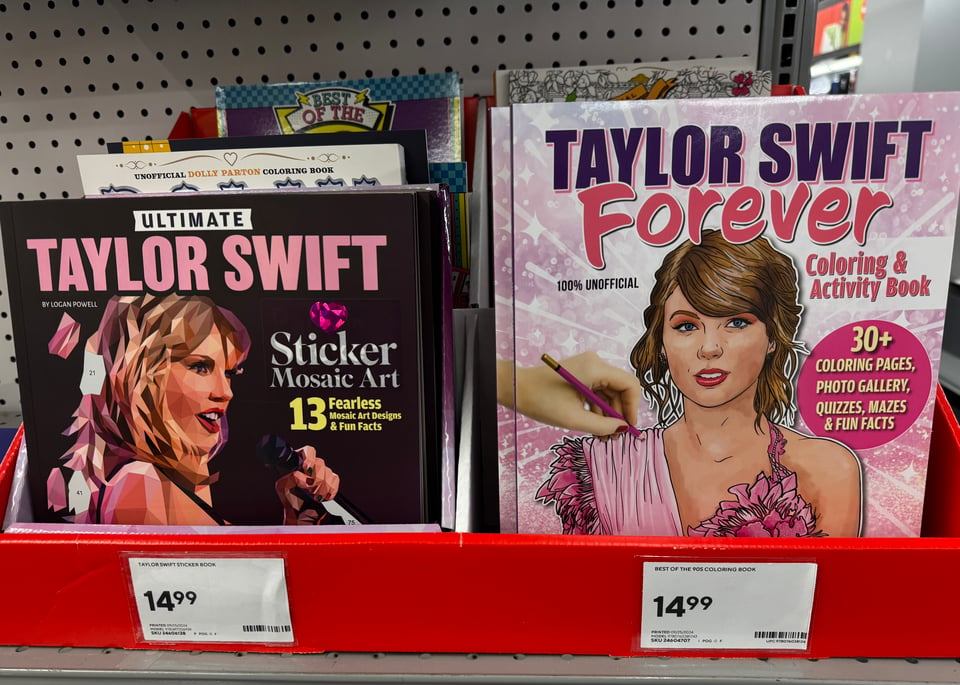
Most of what Joshua did was an extension of his politics and he would likely object to there being a division between his self (whatever that is) and his politics (which he once described as “Marx-ish” and often as simply Communist). I did not know that in 1997, when I was just seeing the name “Jane Dark” appear for the first time. On June 25, 1997, still under his pen name, Clover wrote this self-answering Q&A about Hanson’s “MMMBop” for the Voice. The prompt was “Why Has the Fluffiest Single of the Year Inspired The Most Critical Chatter?”:
(1) Given the towheaded auteurs and a love ode that keeps scratching itself, how come nobody discusses this as an answer to "She Bop"? (2) Or does unworldly equal otherworldly? (3) Isn't the perfect pop song just a form of government thought control? (4) What's the missing link between AA Milne and JJ Fad? (5) What's the genesis of a nonsense syllable? (6) Are they Beck's dust brothers, or his musical youth? (7) What do Hanson and Sleater-Kinney have in common? (8) Why mix a turntable twitch into a pop song?
A: (1) They're too busy wondering if it's an answer to MMMBop! (Got You All In Check). (2) Oh, angel-boys of Tulsa-a nation burns its lonely eyes on you. (3) Be my conspiracy. (4) LL Cool Whip. (5) Someone blows up a Federal Building, it's bound to damage the alphabet. (6) While he cuts the Spanish-language version, they pass the bubblegum from coast to coast. (7) "Dum dum de-dee de-dum dum de-dum yeah (rock the little babies with one-two-three)" (8) That's no pop song, it's an itch the whole nation has to scratch.
What I kept looking for after his death was the the first essay published under the Jane Dark byline, the first writing of Clover’s I remember reading. I found it with the help of a writer named Rainer Diana Hamilton (and then remembered that I have had ProQuest access for years and could have done this myself lol but thank you RDH). This was published in September of 1997 and when I read it, the day it came out, it made me drop my noodles. Or, more likely, I dropped the tofu burger I was eating at Dojo, a few feet east of Sounds, where I shopped almost daily. I am including a scan of the whole page because this is what I read. The Village Voice came out on Wednesday morning and there was not yet a web version. You had to go find it on your feet and pick it up with your hands.

I needed to know who Dark was. (The JPEGs I’ve included work well on a phone—just pinch and zoom.) The following two Dark comments are from the Voice’s Pazz & Jop Poll, published on February 24, 1998. I still had absolutely no idea who this person was, in their life outside these words.
Like Jehovah, Bob Dylan is craggy, pissy, spiteful, and unrelenting. Both had long hot streaks and ended up beloved largely for not being their sons. But where once Dylan married Rimbaud and Woody Guthrie. now he's speaking plain and direct as if nothing should interfere with the fucking Truth-not the poetic nor the dreamy, not a scratchy groove nor even a melody. Time and again he backs out of notes he could hit, or drops lyrical lead weights on our heads, just to prove he means it man.
I bought the "MMMBop" cassingle for 99 cents before there was a disc to buy; I'm trying to remember if I felt the same or different than when I bought the 45 of "More, More, More" by Andrea True Connection same price, 20 years ago! Porn stars, pubescent boys, whatever-I think I felt the samer than ever, like there was a wire running through my life that still lit the same light behind my eyeballs.
After Spin ran my review of Run-DMC’s Crown Royal in 2001, Clover wrote to our mutual editor, Jon Dolan, to say I was “en fuego.” We became friends. I did not know his poetry or why he needed a pen name. Here is that review, also a scan, same reasons:
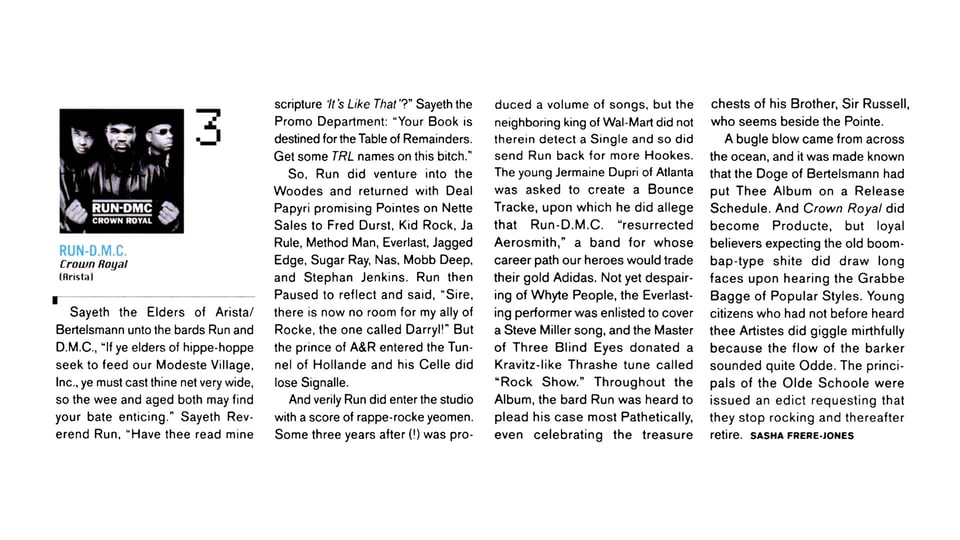
We went to see Nikka Costa together at Irving Plaza in December of 2001. Joshua noted that her drummer looked like Osama Bin Laden, which was true. Right around this time, he ended up quitting Spin, a story he eventually told in this 200-tweet thread (archived on Genius and worth reading right now) from July of 2015. I found an exchange we had as he was posting the series.
Monday, July 20, 2015
SFJ: your pinned tweet goes to a 404
JC: there’s some truth to that.
SFJ: ok well carry on these tweets are not coming fast enough #Taylorism
JC: well the story’s almost done i want it to be done i didn’t expect this thing to happen
SFJ: that's what you get for being good at something so there
JC: lol people just love memoir
One of the tweets in this thread was, “My politics are clarifying in this period, intensifying, weighing on me.” I realize now the same was true of me, largely because of 9/11 and Joshua. I think it is fair to say that before this moment I didn’t really have anything that could reasonably be called a “politics,” beyond liking Bertolt Brecht. After he quit, Joshua gave me his singles column or, rather, encouraged Jon Dolan to assign the task to me.
In 2003, Abe Burmeister of abstractdynamics.org started hosting a handful of writers: Joshua, me, Mark Fisher, Julianne Shepherd, Philip Sherburne, and a few others. The first one was Fisher, in September of 2003, and a month later, it was my turn. In April of 2004, Clover/Dark was added. In September of 2004, Abe met me and Julianne in person. During this period, Joshua and I talked about songs almost every day. There are hundreds of songs that make me think of him, including The Tamperer’s “If You Buy This Record, Your Life Will Be Better.” I am not sure I have ever met someone who even knows that song, which people probably think is a remix of “Material Girl,” which it also of course is.
Abe built an online structure that allowed the abstractdynamics websites to last, something you cannot say of the editors at fancy magazines we otherwise wrote for. Abe was precisely the kind of person Joshua was always conjuring into existence with his work; which is to say, that the collective action Clover thought about was instantiated in and through his writing. It was always a mic check asking to be answered. It often was.
In this Voice piece from 2003, I mentioned a comment Dark had written for the Pazz & Jop poll. It feels like a fragment of our near-daily conversation.
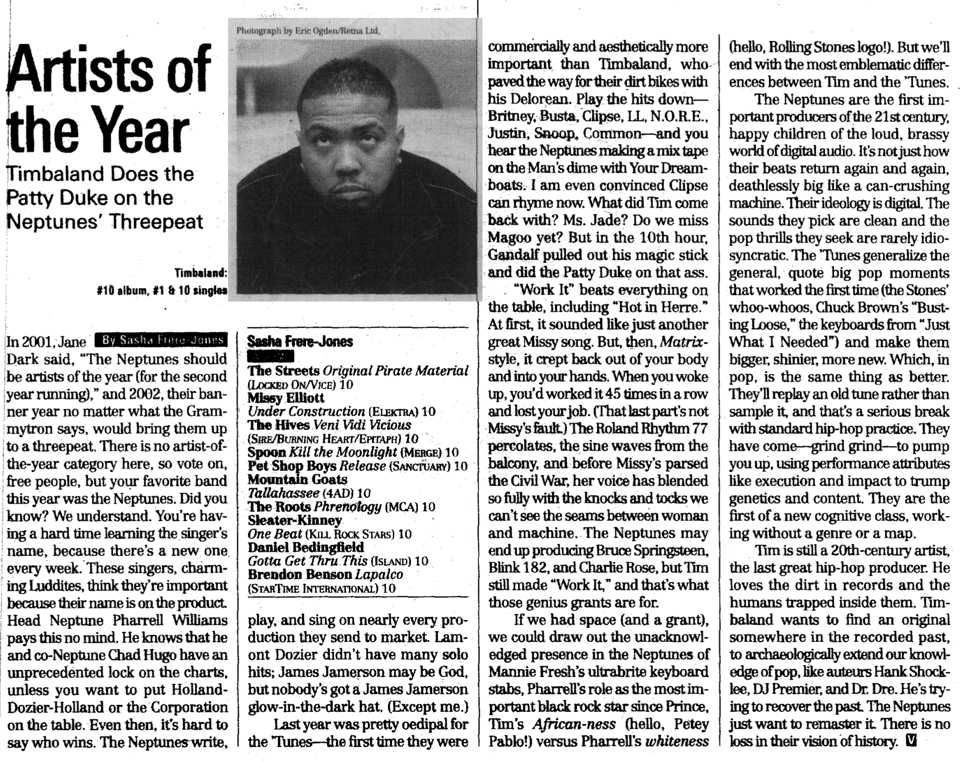
Joshua stayed at my house in Manhattan right after this. In the morning, he made a theatrical point of saying he was going running. He bent some old running shoes and finding them lacking in springiness, tossed the pair grandly into a big black garbage bag. Who travels around with more than one pair of running shoes?
“I need somewhere to go,” he said. “Anywhere with a long distance, I just need distance.” I suggested the West Side Highway. I asked if he ran to music.
“Of course. Otherwise I would be left to my thoughts. Never that.”
I stayed with him in Berkeley a few months after this. We rehearsed our few songs (the Miranda Lambert and the Grant Hart) and he took me to the SPD books warehouse. I bought Etel Adnan and Michael Palmer and Lyn Hejinian. I had just gotten The New Yorker gig, which he was cold about. He said he liked a long piece about Boeing they had run once. “Be careful,” he said. “Sometimes you write the magazine and sometimes the magazine writes you.”
He was kind about my first column for the magazine, which was also my first piece about Arthur Russell. In the following years, he was less kind or, more accurately, only intermittently kind. I wish I had heard more about how I failed him. I might have agreed. His standards were worth meeting, generally. I also value softness more as I get older and I don’t think Joshua, at least the Joshua I knew, valued that. He wanted to fight with people and he did, and he converted all that cortisol into the strength he needed to fight on behalf of others. My ways of helping are different—in recovery, you’re dealing with someone at an actual low rather than a potential high. That is not a slight, as I often mimic Clover’s bravery. The highs you reach as the member of a collective are also not imagined. They are real and the fellowship of AA is actually existing Communism, or close to it, and if I notice that or care about it, that’s another way of seeing the world I borrowed from Joshua.

March 3, 2010
JC: Hey, I thought I would say hello, as I was just reflecting on how much I admired you and your work. That is all.
October 4, 2010
SFJ: Did Brod approach you about being included in “SPIN Greatest Hits”? This book is inconceivable without you in it, though I can conceive of you declining inclusion.
JC: i don't even know who Brod is.
SFJ: That's a shame. Doug Brod, who is the current editor and assembled book. Lame.
JC: well, they didn't like much, once Craig left. And I can't imagine my contributions would have fit well with the corp aesthetic, retrospectively. though a couple of the shredder columns were pretty funny.
Soon after, I got a job co-editing the Arts and Culture section of The Daily, the iPad-only publication that was Rupert Murdoch’s personal project. (I continue to work at The New Yorker, which is confusing but true.) My co-pilot Claire Howorth did most of the heavy lifting. I gave my friends work (shout out to Andy Zax’s X-Ray columns) and recovered from massive hangovers with cold brew from a place called WTF Coffee near my house in Fort Greene. Because I also lost access to my sasha@thedaily.com account, I only have the few emails that I forwarded to my gmail. This era had it all: Joshua’s principles, his warmth, his flexibility, and some of his writing. I will reproduce it here because The Daily is in a very interesting digital materialism bind. (Clover, one of the first people to write seriously about MP3s and iPods and Kazaa and the collective possibilities of file-sharing, must have thought this was amusing.) The Daily only existed in the app itself; some pieces were posted on the website as screencaps, but only a few. When The Daily folded, the archive disappeared. I helped one writer retrieve a piece by going directly to The Daily’s lawyer, because we got along. I don’t think any of what we did can be accessed without NewsCorp lawyers and, even then, it might truly all be gone.
December 20, 2010
SFJ: You want to write a country column for me? One song a week.
JC: That is very good of you to ask. You won’t be surprised to hear that is something I can't do. How’s tricks?
SFJ: Nope. Not surprised. Tricks are just wall-to-wall work. Step one of a five year plan. Pretty energized, more so than that last few years, which just felt like treading. Book creeps along. How’s upstate?
JC: I’m hiding from the snow in Cali right now. So far my Crazy Cornell trip has been pretty nice; I have met a couple smart+sympatico peeps, and enjoyed the mild decrease in busy-ness. Only mild, though; I just finished a 4500 word book review for LA Review of Books, have a 3000 word piece due for The Nation next week, and indeed, yes, this damn theory book. I’m a little worried to go back in Jan — really I am such a pussy
about winter. But I am sure I’ll endure it.
SFJ: I often think of your “fuck the cold” party line, which unfortunately is mine now. Flirted for two years with LA move but now stuck here. What’s the theory bk?
JC: I say yo fuck the cold I say it just like Easy
once upon a time said fuck the po-leezy
don't get out the kitchen if you must have the heezy
i'm a i'm a hot boy just like lil weezy
SFJ: That should be a fairly easy book to write.
JC: uh oh, thou hast made a quip i didn't get!
SFJ: Only semi-quip—I had just asked what the theory book was going to be, before the temperature rap started to be rapping.
JC: oh i missed that question. the theory book is about poetry and how to think about value theory in economics. It will be read by 150 people. It will be useful to forty of them. It turns out I am okay with that, because I want to know what the book says, myself. But I think this is the last time I’ll do such a thing. Enough is enough and there are no more promotions for me.
Just curious: what would you have offered me for one song a week?
SFJ: I’d read it buy it. Hardly affects the cost-benefit ratio.
I could get you $500, our current top rate. Word count would be kinda up to you. Assume you wouldn’t go super long on a single song, and fixing word counts is annoyingly important with these primitive templates.
JC: well, you'll get someone excellent, for that dough. rupert has motherfucking pockets, huh?
February 17, 2011
JC: hey, just thought i'd check in, see how your birthday was, how the launch went, whether you found someone nice to write about country, and all that jazz. xo, jclo
Somehow, I ended up convincing Joshua to write for The Daily. I don’t have the “OK, I give, I’ll do it” back and forth, but I have the following. I can’t swear that every single assignment was like this but when he wrote for me at The Daily (and other gigs I knew about), he wrote to length and did not allow any changes to be made, unless it was absolutely necessary (and to his mind, it usually was not).
April 23, 2011
SFJ: I am sure you told me, but when are the next three coming in?
JC: Do I not always send them in Sunday Night/Monday Morning? I think I do. Do you need them before? I have one done. Could do the others in fairly short order.
SFJ: Sunday night is perfect. No need to accelerate.
JC: I believe I am giving you your money’s worth, Wigglesworth.
“Super Bass” (Young Money / Universal Motown)
Nicki Minaj
Nicki Minaj is complicated. She is not really of the righteous feminist hip-hopper persuasion (you could probably play with her yo-yo), but keeps an ironic distance from the Bad Bitch School of Rap (main campus in Miami). She hasn't yet approached Missy, a legit musical savior. She’s theatrical sham and down girl all at once, an overnight megastar without a clear calling card, future of the funk or already on the way out. It’ll make you dizzy. But that is the truth of popular culture now, more exaggerated and less graspable than ever, a hysterical uncertainty that also dominates politics domestic and international. Call it crisis funk, and Nicki is its pink-wigged mistress: she perches between its horns and rides it around like it was a kind of circus. And when she rides, it sort of is. That’s what makes her great, and somehow soothing, never more than in the throwback groove of “Super Bass,” with its sweet and meticulously designed thinness redolent of “My Boo,” its callouts to L’Trimm and Slick Rick. It’s a song that looks back not in anger, not in nostalgia, but to orient itself in the aimless present, a security blanket on the dancefloor.
JANE DARK/200 words
“Family Man” (Bigger Picture Music Group)
Craig Campbell
There’s a semi-secret melancholy haunting this otherwise familiar song of domestic virtue, the kind of touch that makes a trite song mysterious and moving. Country music is based on the dual cycles of the working week and of family generations, labor and love, production and reproduction. Craig Campbell’s breakthrough tells the usual story of a guy sweating for his wife and kid, suffering cycle one to support cycle two. Except he’s working as a temp in the first verse hoping to stick at the shop, then doing dishes and childcare in verse two — in a way that suggests not so much gender equality, but that there was nothing for him down at the factory. In its understated and perhaps unconscious way it’s a song of precarious labor and its difficult turnarounds, its fears and failures and small humiliations, and even its small rewards, its stolen moments of bittersweet freedom from work, and the resolve one discovers. All this ambiguous feeling is captured and cached, somehow, in the perfect little melodic turnaround before the chorus. And is that not the magic of songcraft? These are the most delicate rescued moments that one can hears, in which one can hear the new depression.
JANE DARK/201 words
“Higher” (Island)
Taio Cruz feat. Kylie Minogue and Travie McCoy
So track comes on and dude starts singing and you're pretty much like OK, fine, Taio Cruz, maybe you're the British Jason Derulo, whatever, there's not much going here, how did this hit #2 in Norway and Poland and #8 in Slovakia? And just like that Kylie comes on, oh right, to slay you with the chorus which pretty much guarantees that you chart, maybe #9 in Belgium with basically a non-song, because Kylie is pure money, she's like gold leaf applied to the radio so it shimmers in the day and burns in the night, even if there’s nothing going on behind it, even if the track is cold and ungiving, so it’s sort of like gilding the chilly, right? Which must make Taio Cruz pretty happy until he begins to wonder how many duet partners Kylie has left dead on the dancefloor of pop history, Robbie Williams, Jason Donovan, Jimmy Little, Ben Lee, Keith Washington, and now Taio is hardly even singing, he’s wondering if he has a good money manager, and if those “Dynamite” dollars from last year will hold out for the next three or four decades, by which time Ms. Minogue will just be hitting her stride.
JANE DARK/200 words
We seem to have almost gone to Coachella together in 2015 (but did not), and last corresponded (warmly) in 2016. As for what happened in the following nine years, I don’t know. I cannot decode that gap and only way I have been able to process Joshua’s newer and more permanent absence is by reading him and remembering what I owe him, and that may, in fact, be everything. When I say read everything he wrote, I mean that you should do what I am doing here: a reading group, if you will. I am reading 1989 again, slowly, and then I will move on to Riot. Strike. Riot. After that, I will return to all the poems. I realize now that one reason I am doing it this way is that I cannot now and likely will never be able to read all the hundreds of emails we wrote to each other in the aughts. Joshua would be the first person to point out that this loss was rooted in corporate inhumanity and that the collective the two of us formed has, in fact, refused to die.

This issue of the newsletter, like all the others, is free to read and unpaywalled. This newsletter is also my only reliable monthly source of income, so your money is warmly welcomed. That said, better to sign up and get your friends to sign up than not read because you don’t have any money. Pay when you can—in five years, or never—but please read it and share it.